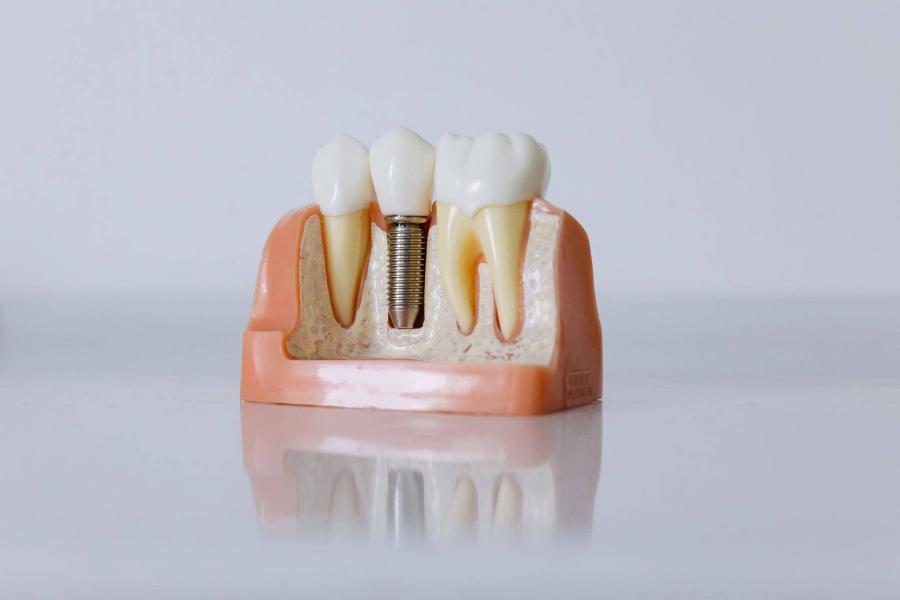If you are looking for a solution for your missing teeth, dental implants provide patients with high-quality replacements that will last a lifetime. Dental implants are designed to look and feel like the rest of your teeth. Most dental implants are made from titanium and act as the new tooth root by bonding to the surrounding jawbone. Once fused with your jawbone, the implant serves as a durable foundation for dental crowns, bridges, or dentures, depending on what your dentist recommends for you.
Dental implants are a popular and reliable method for replacing teeth surgically removed or affected by tooth decay. Implants offer many aesthetic benefits and play an essential role in the overall function of your mouth.
Permanent Tooth Replacement
The main health benefit of dental implants is that they are a permanent solution to missing teeth. Their durable material enables them to last a lifetime if cared for properly. Once the dental implant bonds to the jawbone, it is topped with a dental crown, bridge, or dentures. In addition, because the dental implant’s material is biocompatible, there is no risk of the body rejecting it.
Dental implants also don’t require any adhesives since they are surgically drilled into the jawbone. They naturally fuse into your jawbone, so they aren’t going anywhere. You can eat, talk, and smile with confidence.
Dental crowns coupled with dental implants are a common combination that patients request to replace missing teeth. To add to their durability, dental crowns are fixed to the implant’s abutment—a connective piece that joins the prosthesis to the implants—using specialized dental cement for a strong bond.
Protection from Cavities
Cavities only occur on natural teeth with enamel and a root. Since dental implants are made from titanium and dental crowns are made from metals, porcelain, resin, and ceramics, cavities cannot form on the prosthetic material. There is no risk of decay. However, routine visits to your local dental office are still essential to continue caring for your teeth and gums. Brushing and flossing around the dental implant are still important, just like a natural tooth. In addition, since dental crowns are not porous, they are not susceptible to bacterial erosion.
Renewed Confidence
Many patients feel a boost of confidence once they receive dental implants. When you have missing teeth, you may hesitate to smile or avoid talking in front of people. But after a dental implant procedure, you will regain your natural smile. Dental implants benefit oral health and increase self-esteem and emotional well-being.
Whether you are missing one tooth or several, having the extra space in your mouth makes it difficult to speak clearly and eat. It also takes a toll on an individual’s confidence, which can affect work productivity and social interactions. But with dental implants, you can fill in gaps in your teeth that may have caused you social anxiety, lack of confidence, or trouble eating.
Better Nutrition
With missing or damaged teeth, it is difficult to maintain a balanced diet since most patients only eat soft foods to avoid discomfort. But once the dental implant site is fully healed, you can eat and enjoy your favorite foods. This means you can bite normally and chew food as you did before losing teeth.
The implants must have time to heal. That is why dentists often recommend patients eat soft foods or go on a temporary “liquid diet” consisting of soups, yogurt, and similar foods to avoid discomfort. When the dental implant and dental crown are both firmly joined and the gums are fully healed, patients should be able to eat all the foods they enjoy.
Restoring Bite Force
A dental implant can restore and improve your bite force since dental implants are embedded in your jawbone and made out of metal alloys. Each dental implant has an abutment where a dental crown or dentures are attached. In other cases, multiple implants are used to hold bridges in position. By anchoring prosthetic teeth to your jaw, you can feel more confident that they will stay in place when you bite into harder foods.
Dental implants are like fence posts that are placed in holes underground. By attaching a dental crown to a dental implant, you aren’t just holding it in place. Your dentist is providing a foundation that puts some force behind your bite so you can confidently chew your food.

Isreal olabanji a dental assistant and public health professionals and has years of experience in assisting the dentist with all sorts of dental issues.
We regularly post timely and trustworthy medical information and news on Fitness, Dental care, Recipes, Child health, obstetrics, and more.
The content is intended to augment, not replace, information provided by your clinician. It is not intended nor implied to be a substitute for professional medical advice. Reading this information does not create or replace a doctor-patient relationship or consultation. If required, please contact your doctor or other health care provider to assist you to interpret any of this information, or in applying the information to your individual needs.


